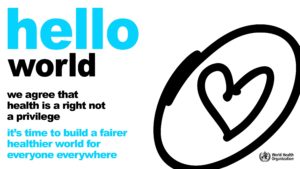Good health for the young, the old and the vulnerable must be built on respect for their humanity and on good relationships, writes ANDY HAMILTON SJ.
 Most Australians are fortunate enough to be able to take their health for granted for much of their lives. We have sufficient food to keep us strong; we have access to the doctors and hospitals where we can receive medical care for quite complex illnesses and where our lives can be saved in the case of emergencies. We can live most of our lives without suffering from serious ill health.
Most Australians are fortunate enough to be able to take their health for granted for much of their lives. We have sufficient food to keep us strong; we have access to the doctors and hospitals where we can receive medical care for quite complex illnesses and where our lives can be saved in the case of emergencies. We can live most of our lives without suffering from serious ill health.
Even in our privileged society, of course, that is not everyone’s experience. Many people have lived with poor health from childhood; others have contracted debilitating sicknesses early in life or have suddenly discovered that they are incurably ill. In the developing world that is often the rule. Lack of food or clean water create a breeding ground for illnesses in a society in which there are no resources to address them. Disease can spread quickly and take many lives. Children are particularly vulnerable.
During the COVID-19 crisis, we have experienced personally the fears and the uncertainty that our ancestors felt when sickness came and which people in developing nations may still feel. We have seen repeated in our own society the anxiety, the debates about how to respond, and the lockdowns that were prevalent during the great flu epidemic at the end of the First World War. We have shared the same anxieties about the health of our children and seen clearly how poverty and illness go together, while at the same time goodness and resilience are everywhere to be found. The heroes of the epidemic were the medical staff, the cleaners and food deliverers who risked their own lives to help others. World Health Day offers the opportunity to honour all these unsung heroes.
The Victorian Mental Health Royal Commission and the Federal Government Royal Commission into Caring for the Ageing put the focus of attention on to people’s lives. They insisted that reform should centre on the human rights of the people being cared for and not on the needs of carers, managers or governments. They grounded care for health in respect for the human dignity of each human person, regardless of their mental state or capability. They affirmed that a person in advanced dementia is as entitled to appropriate care as a person in good health. Respect for human dignity entails considering all the relationships salient to a person’s well-being and ensuring that they too are built upon respect. They extend beyond simply keeping a person alive and sheltered, to ensuring that they are adequately fed, clothed, clean, provided with medical care, and consulted about any treatment they receive. Care must also begin with and be supported by good personal relationships with people who have time to care, are sufficiently empathetic and have sufficient knowledge of their condition and needs.
We take these principles for granted when we are young and active, but for both young and ageing people, consultation can easily turn into dictation and people’s rights into privileges given or withheld at others’ choice. That is the risk constantly facing the young vulnerable people who we serve at Jesuit Social Services. They are often treated as pawns on the board of policy making and not as the kings and queens who must be kept safe. Good health for the young, the old and the vulnerable must be built on respect for their humanity and on good relationships.



